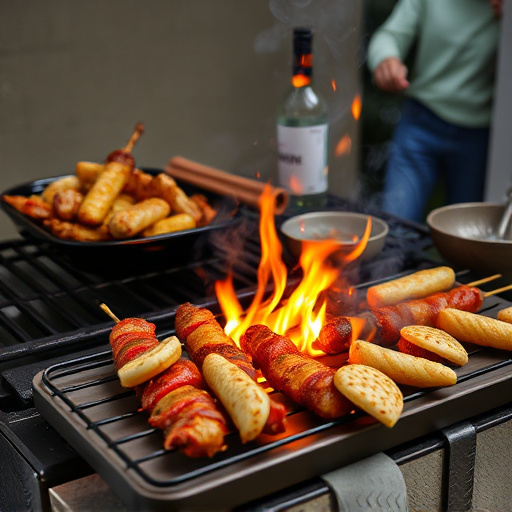Choosing the right lean meats (beef sirloin or chicken breast) and using a well-crafted marinade with brown sugar, salt, paprika, garlic powder, onion powder, black pepper, cayenne, and liquid smoke is essential for creating a delicious BBQ jerky recipe. Smoking at consistent temperatures (107°F–125°F/42°C–52°C) using woods like oak, hickory, mesquite, or applewood enhances flavor. Maintain 165°F to 203°F (74°C to 95°C) for food safety and quality. Properly dry jerky in a cool area, then store in an airtight container or vacuum-sealed bag. Experiment with creative flavor combinations like chili powder, maple syrup, cumin, thyme, or rosemary to make a unique BBQ jerky recipe. Avoid common mistakes: undercooking, using low-quality ingredients, and skipping marination/dehydration steps. Homemade BBQ jerky provides protein, essential amino acids, natural preservation, and reduced sodium/preservatives compared to store-bought varieties.
Looking to craft the perfect sweet and smoky BBQ jerky? This comprehensive guide is your recipe for success. From choosing the right meats to mastering smoking techniques, we break down every step in preparing a delicious homemade BBQ jerky that’s sure to please. Learn about effective marinade blends, temperature control tips, and even discover creative flavor combinations. Avoid common mistakes and understand the health benefits of making your own BBQ jerky – all in one place for an ultimate preparation guide.
- Choosing the Right Meats for BBQ Jerky
- Marinade and Seasoning Blend: The Heart of Smoked Flavor
- Smoking Techniques for the Perfect Jerky
- Temperature Control: A Key to Quality Jerky
- Drying and Storage Tips for Long-Lasting Jerky
- Creative Flavors to Elevate Your BBQ Jerky
- Common Mistakes to Avoid During Preparation
- Health Benefits of Homemade BBQ Jerky
Choosing the Right Meats for BBQ Jerky
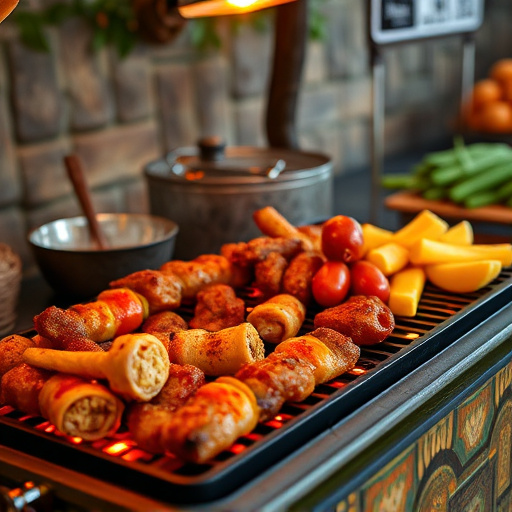
When preparing sweet and smoky BBQ jerky, choosing the right meats is crucial for a successful BBQ Jerky Recipe. Opt for lean cuts like beef sirloin or chicken breast to ensure your jerky turns out crispy and not greasy. These cuts of meat have less fat content, which is ideal as excess fat can make your jerky tough and chewy. Look for around 90-95% lean meat for the best results.
The quality of your meat significantly impacts the final flavor profile of your BBQ Jerky Recipe. Fresh, high-quality meats will result in a more vibrant and consistent taste throughout each piece of jerky. Make sure to select meats that are free from any visible fat or sinew. Properly trimming the meat ensures an enjoyable eating experience, providing a tender and flavorful snack.
Marinade and Seasoning Blend: The Heart of Smoked Flavor
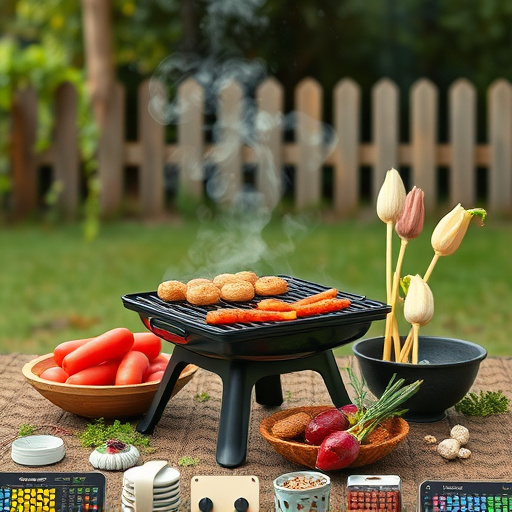
The key to unlocking the rich, smoky flavors in your BBQ jerky lies in the marinade and seasoning blend. This magical combination is the heart and soul of any great BBQ jerky recipe. Start by mixing together a robust blend of brown sugar, kosher salt, paprika, garlic powder, onion powder, black pepper, cayenne pepper (adjust to your preferred spice level), and a touch of liquid smoke. This blend creates a complex flavor profile that enhances the natural meat juices, resulting in tender, succulent jerky.
For an extra depth of flavor, incorporate a marinade made from a combination of apple cider vinegar, soy sauce or Worcestershire sauce, olive oil, and your choice of herbs and spices. Letting the meat soak in this mixture for several hours or even overnight allows the flavors to penetrate deep into the muscle fibers, transforming simple beef strips into a gourmet treat.
Smoking Techniques for the Perfect Jerky
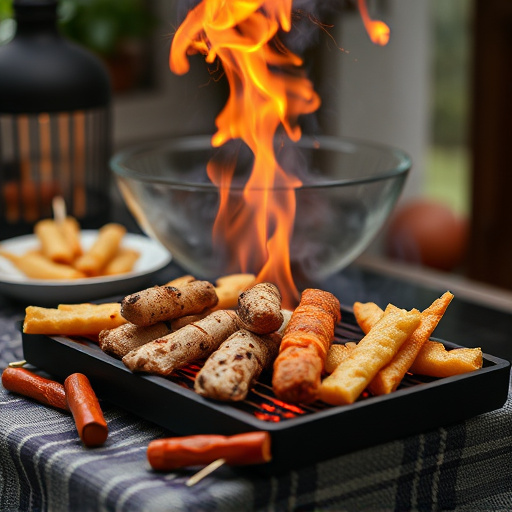
Smoking is an art that can elevate your BBQ jerky recipe to new heights. The technique involves gently cooking meat in a smoky environment, allowing flavors to penetrate and develop a distinctive taste. Choose your preferred smoking method—whether it’s a traditional wood-fired smoker or a modern electric one. Wood chips or chunks add that crucial smoky flavor; oak, hickory, mesquite, or applewood are popular choices. Maintain a consistent temperature between 107°F–125°F (42°C–52°C) for slow-smoking, ensuring the meat cooks evenly while retaining its moisture. This method takes time, but the results are worth it—a tender, flavorful jerky that will satisfy any BBQ enthusiast.
For a more intense smoke flavor, consider cold smoking, which involves maintaining very low temperatures (around 57°F–68°F or 14°C–20°C) for an extended period. This process adds depth to the jerky’s taste profile without overcooking the meat. Experiment with different woods and spices to create unique flavors that cater to your palate. Remember, smoking is a skill that improves with practice, so don’t be afraid to experiment and refine your technique for the perfect BBQ jerky recipe.
Temperature Control: A Key to Quality Jerky
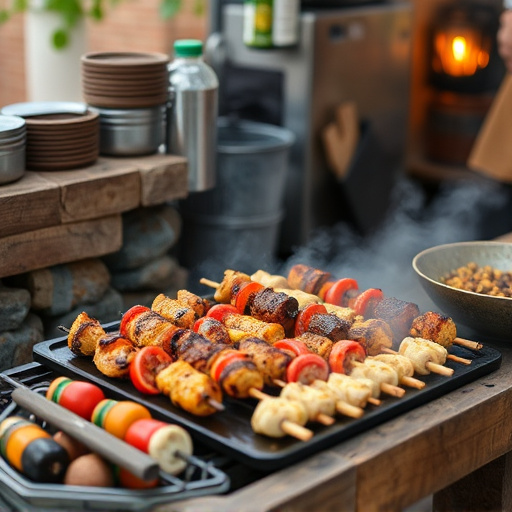
In the quest for perfection in your DIY BBQ jerky recipe, temperature control is a crucial element often overlooked but significantly impacts the final product. The art of making jerky involves a precise balance between cooking the meat to kill bacteria and preserving its tenderness and flavor. Typically, this process unfolds over low, indirect heat, allowing the meat to gradually dry out while developing that distinctive sweet and smoky BBQ taste.
Maintaining a consistent temperature throughout the cooking process is key. Too high a heat can lead to tough, leathery jerky, while inconsistent heating may result in undercooked sections that pose potential food safety risks. Ideal temperatures for jerky preparation usually range between 165°F and 203°F (74°C – 95°C). This range ensures the meat is fully cooked, killing any bacteria or parasites, while preserving its moisture content, resulting in a delicious, tender, and safe BBQ jerky treat.
Drying and Storage Tips for Long-Lasting Jerky
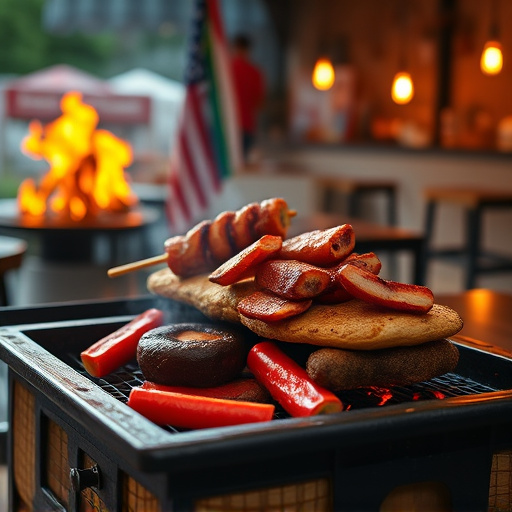
After preparing your sweet and smoky BBQ jerky, proper drying and storage are key to ensuring its longevity and quality. Hang the jerky in a cool, dry place with good air circulation. This could be a pantry or a designated jar rack. Allow it to rest for at least 24 hours to fully dry out, which helps prevent mold growth and prolongs shelf life. Once completely dry, transfer your jerky to an airtight container or vacuum-sealed bag. Store it in a cool, dark place, such as a refrigerator or freezer. This preserves its flavor and texture for several months, making it a convenient snack option whenever you crave that delicious BBQ Jerky Recipe.
Creative Flavors to Elevate Your BBQ Jerky
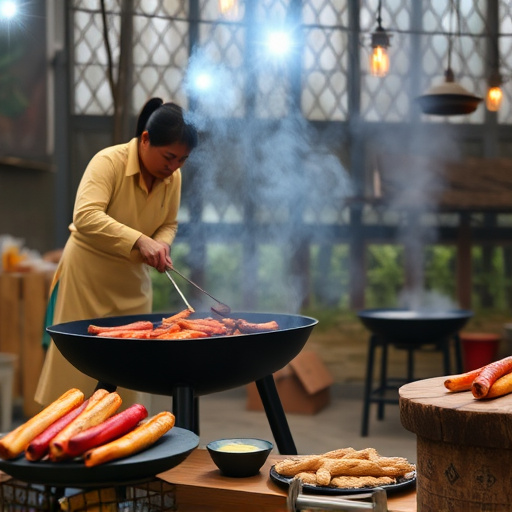
When crafting your sweet and smoky BBQ jerky, don’t be afraid to get creative with flavors. Beyond the classic BBQ sauce, there’s a world of options to elevate your jerky experience. Consider adding a touch of heat with chili powder or cayenne pepper for an extra kick. For a sweeter twist, incorporate brown sugar or maple syrup alongside the traditional molasses for a delicious blend.
Experimenting with spices like cumin, paprika, or even a sprinkle of coffee grounds can add depth and complexity to your BBQ jerky recipe. Don’t underestimate the power of herbs; thyme, rosemary, and oregano can impart earthy, aromatic notes that complement the smoky flavor beautifully. Get adventurous in your ingredient choices to craft a unique, mouthwatering BBQ jerky that’s sure to impress.
Common Mistakes to Avoid During Preparation

When preparing sweet and smoky BBQ jerky, there are several common mistakes that home cooks tend to make. One of the most frequent errors is undercooking the meat. Jerky should be lean and dry, so over-moisture can lead to a mushy final product. It’s crucial to follow the recommended cooking times closely, ensuring the jerky reaches an internal temperature of at least 160°F (71°C) for food safety.
Another mistake is using low-quality ingredients or skipping essential steps like marinating and dehydrating properly. Using a cheap cut of meat with visible fat can result in a tough, unappetizing final jerky. Skipping the marinade not only affects taste but also prevents the meat from absorbing the flavorful BBQ sauce evenly. Always opt for lean cuts and follow the recipe’s instructions for marinading and drying to achieve the best-tasting BBQ jerky recipe results.
Health Benefits of Homemade BBQ Jerky
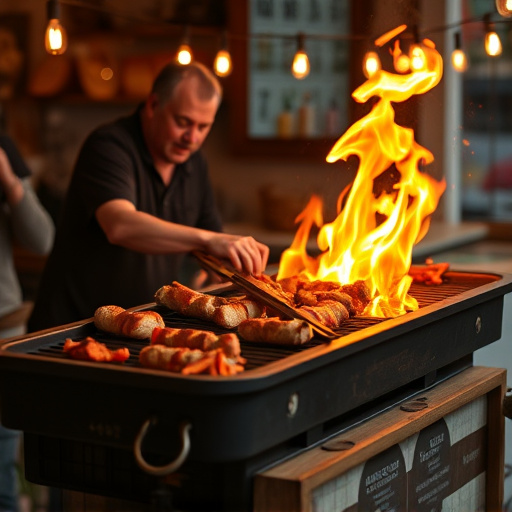
Making your own BBQ jerky at home offers a healthier alternative to store-bought varieties, providing a nutritious and delicious snack option. Homemade jerky allows you to control the ingredients, ensuring a lower sodium content and the absence of preservatives or added sugars often found in commercial products. With a simple BBQ jerky recipe, you can create a protein-rich treat packed with essential amino acids, which are crucial for muscle repair and growth.
The smoking process involved in making BBQ jerky also contributes to its health benefits. Smoking acts as a natural preservative, extending the shelf life of the meat without relying on artificial means. Additionally, the sweet and smoky flavor profile adds depth and complexity, satisfying your taste buds while potentially reducing the desire for less healthy condiments or snacks.
